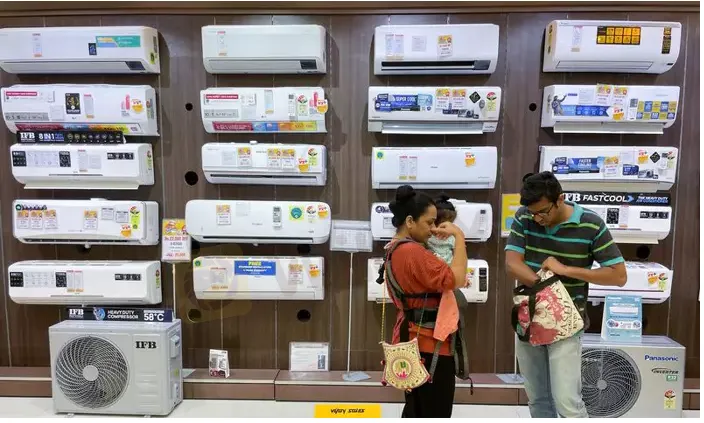简体中文
繁體中文
English
Pусский
日本語
ภาษาไทย
Tiếng Việt
Bahasa Indonesia
Español
हिन्दी
Filippiiniläinen
Français
Deutsch
Português
Türkçe
한국어
العربية
India inflation may remain elevated despite July dip
Abstract:India’s headline retail inflation that eased for the third straight month in July is expected to remain above the central bank’s upper tolerance range in the near term, necessitating more rate hikes in coming months, analysts said.

India‘s consumer inflation dipped to 6.71% in July, helped by a slower increase in food and fuel prices. The year-on-year figure, published on Aug. 12 by the National Statistics Office, was marginally lower than the 6.78% forecast by economists in a Reuters poll, but it remained above the central bank’s tolerance band for a seventh month in a row.
The Reserve Bank of India aims to maintain inflation at 4.00% in the medium term, with a tolerance range of 200 basis points on either side.
“The outlook on food inflation still faces uncertainties given the uneven rainfall. For the first two weeks of August prices of vegetables, cereals (rice and wheat) and pulses are tracking higher. Rice sowing has been impacted by deficient rainfall in key producer states,” said Gaura Sen Gupta, India economist at IDFC First Bank.
Even as inflation eases, economists believe the RBIs monetary policy committee will continue to hike policy rates though the quantum of such moves may come down as compared to the previous three actions.
The MPC has raised key policy rate by 140 basis points to 5.40% since May as stubborn inflation continues to remain a major concern. The next policy decision of is due on Sep. 30 with most market participants expecting another hike.
While Nomura and IDFC First Bank expect the RBI to hike repo rate by another 60 bps to 6.00%, Barclays eyes another 50 bps rise in interest rates over the next two meetings. Meanwhile, Nomura sees inflation to average 6.8% in this fiscal, IDFC First Bank sees it at 6.5%, below central banks 6.7% prediction.
We expect the RBI to deliver two 25 bps rate hikes each at the September and December meetings, taking the repo rate to 5.90%. However, if global commodity prices continue to decline, we note the risk that the bank does not raise rates in
December, Rahul Bajoria, chief India economist at Barclays said.

Disclaimer:
The views in this article only represent the author's personal views, and do not constitute investment advice on this platform. This platform does not guarantee the accuracy, completeness and timeliness of the information in the article, and will not be liable for any loss caused by the use of or reliance on the information in the article.
Read more

The Daily Habits of a Profitable Trader
Every professional trader follows a structured approach to ensure they are well-prepared, disciplined, and able to seize opportunities with confidence. Whether you are a seasoned investor or an aspiring trader, adhering to a robust daily checklist can significantly enhance your performance. Use this checklist to check if you are a qualified trader

The Impact of Interest Rate Decisions on the Forex Market
Interest rate changes determine currency attractiveness, influencing capital flows and exchange rate trends. Understanding this mechanism helps investors navigate the forex market effectively.

How a Housewife Lost RM288,235 in a Facebook Investment Scam
A 47-year-old housewife in Malaysia recently fell victim to an online investment scam, losing a substantial sum of RM288,235 after engaging with a fraudulent scheme advertised on Facebook.

A Trader’s Worst Mistake: Overlooking Broker Reviews Could Cost You Everything
In today’s digital age, reviews influence nearly every decision we make. When purchasing a smartphone, television, or home appliance, we pore over customer feedback and expert opinions to ensure we’re making the right choice. So why is it that, when it comes to choosing an online broker where real money and financial security are at stake many traders neglect the crucial step of reading reviews?
WikiFX Broker
Latest News
The Withdrawal Trap: How Scam Brokers Lure Victims into Paying More
FCA to Investors: Think Twice Before Trusting These Brokers
Trump\s tariffs: How could they affect the UK and your money
Trump gambles it all on global tariffs he\s wanted for decades
TradingView Brings Live Market Charts to Telegram Users with New Mini App
Trump tariffs: How will India navigate a world on the brink of a trade war?
Interactive Brokers Launches Forecast Contracts in Canada for Market Predictions
Authorities Alert: MAS Impersonation Scam Hits Singapore
Stocks fall again as Trump tariff jitters continue
IG Group Acquires Freetrade for £160M to Expand UK Investment Market
Currency Calculator







